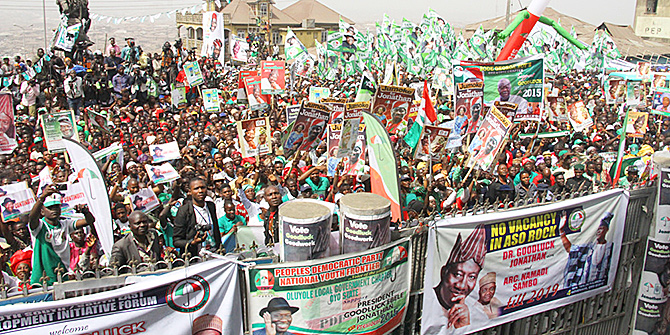Climate-related security risks are growing steadily in central Africa. The state security forces are increasingly called upon to respond to issues being exacerbated by the climate crisis. Freedom Onuoha, Oluwole Ojewale and Chukwunonso Akogwu argue that training on climate-related security risks is needed to better understand the relationship between climate change, peace, and security in central Africa.
Climate change has emerged as an imminent threat to national security in many regions of the world. This reality is more acute in central Africa where surging population growth, rising urbanisation, persistent environmental degradation, emergence of violent extremist organisations and weak state capacity have created a perfect storm of insecurity.
Analysis of climate data from 1991 to 2022 shows that average temperatures are up, the threat of drought is increasing and there are more regular and more extreme flooding events across the region.
Climate change is a threat multiplier for instability, conflict and violence. Competition for natural resources such as water, pasture, and land has already resulted in conflicts in some communities in Africa. Climate change is set to increase such competition even further with the potential to cause or exacerbate natural resource conflicts.
Increasing impacts of climate change in the region
In central Africa, the consequences of climate change are already having a negative impact on the lives and livelihood of citizens, especially those residing in rural areas. There are massive and dynamic climate variations being experienced across the region. At the same time as there is crop flooding in northern Cameroon there are rising temperatures and drought in much of Chad where desertification and scarcity of resources have led to heightened conflicts between crop farmers and cattle herders.
In Chad, the hotspots of climate change-related natural resource conflicts include the Salamat, Sila and Ouaddai provinces. Herders and sedentary farmers have a long and troubled history in southern Chad, where ethnic friction over land is common. In February 2021, about 35 people were killed in clashes involving semi-nomadic herders and farmers in the province of Salamat.
Around Lake Chad, violent conflicts have occurred due to growing water scarcity. The lake’s water has diminished by 70 per cent in the past 50 years, partly due to climate change. However, the population depending on the lake for their livelihoods has increased from 3.5 million in 1960 to over 45 million inhabitants in 2020. In August 2021, about 11,000 civilians fled from Logone and Chari to Chad after a conflict over water between cattle ranchers and fishermen. Forty people were killed and 70 were wounded.
Irregular rainfall patterns in the Lake Chad Basin have created socio-economic shifts that have been linked to recruitment into Boko Haram and the Islamic State as people are pushed to desperate measures to secure their futures.
As competition over land, minerals, fresh water and fishing rights, manifests or escalates parties have sometimes deployed violence in the struggle. There is a consequential linear relationship between climate change, natural resource conflicts and insecurity.
The complexity of security response to climate change
The outbreak or intensification of natural resource conflicts due to climate change will place additional demand on the military in internal security operations and possibly peacekeeping operations.
Central African states should redefine and update the training curriculum for officers of the security and defence forces in light of the rapidly changing national and international security landscapes brought about by climate change. The starting point is to acknowledge that the changing climate has a significant effect on security missions, strategies and installations. The militaries, national security outfits and military education institutions in these countries must elevate climate change as a national security priority. They need to integrate climate considerations into cadet training, refresher courses and national security strategies. This will bolster national capability and posture; it will enable security forces to maintain a strategic edge over the non-state armed groups who exploit the vulnerabilities and fragility imposed on states by climate change.
Members of the regional body, the Communauté Economique et Monétaire de l’Afrique Centrale (CEMAC) should support local initiatives aimed at mitigating climate change through the coordination of policies, building partnerships, resource mobilisation and promotion of national ownership of projects that have been implemented.
As a result of climate change, various shades of insecurity have emerged, and continue to hamper peace, security and development in the region. While climate change is not the direct cause of natural resource conflicts, it has proven to be a multiplier factor in several violent conflicts. To more effectively tackle the climate change–natural resource conflict challenge, the states in the region should employ a whole-of-government approach in pursuit of national security in an integrated manner, aimed at tackling natural resource-based conflicts in the region. It requires establishing or strengthening frameworks that promote inter-agency collaboration and, perhaps more importantly, working together across borders to mitigate a threat that is now facing everyone.
Photo credit: Public domain





